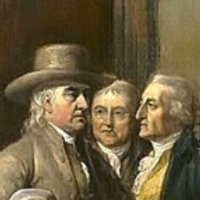The Fundamental Constitutions of Carolina: March 1, 1669
"Twenty-two. In every signiory, barony, and manor, all the leet-men shall be under the jurisdiction of the respective lords of the said signiory, barony, or manor, without appeal from him. Nor shall any leet-man or leet-woman have liberty to go off from the land of their particular lord and live anywhere else, without license obtained from their said lord, under hand and seal."
"Twenty-three. All the children of leet-men shall be leet-men, and so to all generations."
Our sovereign lord the King having, out of his royal grace and bounty, granted unto us the province of Carolina, with all the royalties, properties, jurisdictions, and privileges of a county palatine, as large and ample as the county palatine of Durham, with other great privileges; for the better settlement of the government of the said place, and establishing the interest of the lords proprietors with equality and without confusion; and that the government of this province may be made most agreeable to the monarchy under which we live and of which this province is a part; and that we may avoid erecting a numerous democracy, we, the lords and proprietors of the province aforesaid, have agreed to this following form of government, to be perpetually established amongst us, unto which we do oblige ourselves, our heirs and successors, In the most binding ways that can be devised.
One. The eldest of the lords proprietors shall be palatine; and, upon the decease of the palatine, the eldest of the seven surviving proprietors shall always succeed him.
Two. There shall be seven other chief offices erected, viz: the admirals, chamberlains, chancellors, constables, chief justices, high stewards, and treasurers; which places shall be enjoyed by none but the lords proprietors, to be assigned at first by lot, and, upon the vacancy of any one of the seven great offices, by death or otherwise, the eldest proprietor shall have his choice of the said place.
Three. The whole province shall be divided into counties; each county shall consist of eight signiories, eight baronies, and four precincts; each precinct shall consist of six colonies.
Four. Each signiory, barony, and colony shall consist of twelve thousand acres; the eight signiories being the share of the eight proprietors, and the eight baronies of the nobility; both which shares, being each of them one-fifth of the whole, are to be perpetually annexed, the one to the proprietors, the other to the hereditary nobility, leaving the colonies, being three-fifths, amongst the people; so that in setting out and planting the lands, the balance of the government may be preserved.
Five. At any time before the year one thousand seven hundred and one, any of the lords proprietors shall have power to relinquish, alienate, and dispose to any other person his proprietorship, and all the signiories, powers, and interest thereunto belonging, wholly anti entirely together, and not otherwise. But after the year one thousand seven hundred, those who are then lords proprietors shall not have power to alienate or make over their proprietorship, with the signiories and privileges thereunto belonging, or any part thereof, to any person whatsoever, otherwise than in section eighteen; but it shall all descend unto their heirs male, and for want of heirs male, it shall all descend on that landgrave or cazique of Carolina who is descended of the next heirs female of the proprietor; and, for want of such heirs, it shall descend on the next heir general; and, for want of such heirs, the remaining seven proprietors shall, upon the vacancy, choose a landgrave to succeed the deceased proprietors, who, being chosen by the majority of the seven surviving proprietors, he and his heirs. successively shall be proprietors, as fully to all intents and purposes as any of the rest.
Six. That the number of eight proprietors may be constantly kept, if, upon the vacancy of any proprietorship, the seven surviving proprietors shall not choose a landgrave to be a proprietor before the second biennial parliament after the vacancy, then the next biennial parliament but one, after such vacancy, shall have power to choose any landgrave to be a proprietor.
Seven. Whosoever, after the year one thousand seven hundred, either by inheritance or choice, shall succeed any proprietor in his proprietorship, and signories thereunto belonging; shall be obliged to take the name and arms of that proprietor whom he succeeds; which from thenceforth shall be the name and arms of his family and their posterity.
1 North Carolina Colonial records 187-205. Locke's Works [Eighth Edition] X. 175. Back
2 This form of government was framed by John Locke author of the Essay on the Human Understanding and amended by the Earl of Shaftesbury previously known as Anthony Ashley Cooper. It was only partially put into operation, and it was abrogated by the lords proprietors in April, 1693. Back
3 This article was not drawn up by Mr. Locke, but inserted by some of the chief of the proprietors, against his judgment; as Mr. Locke himself informed one of his friends, to whom he presented a copy of these constitutions.
https://avalon.law.yale.edu/17th_century/nc05.asp
Brother Jonathan
posted in American Civil War
10/29/2023

